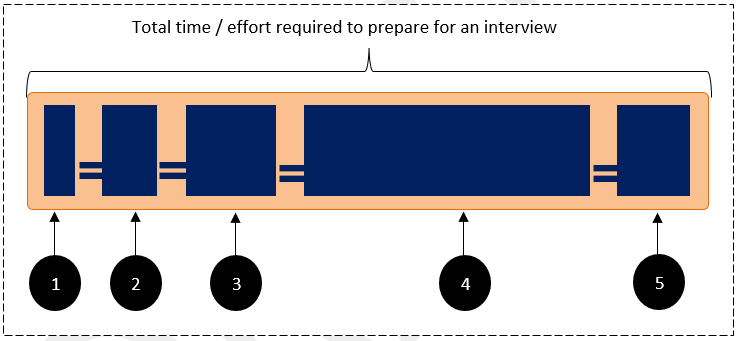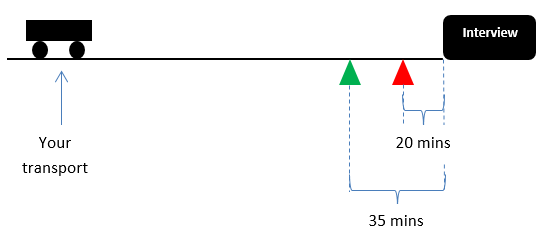This post is sponsored by leading London recruitment agency, CharterSelection.
Preparing for an interview shouldn’t be all about rehearsing the answers. It is more than that. In this article I look at how to prepare for an interview in order to have the maximum chance of getting through it?
A lot of the time articles that speak about how to prepare for an interview speak about questions, answers, the STAR method of answering etc. Well, what about the process of reaching the place, clothes, post-interview actions etc?

Fig: Total time / effort required on preparing for an interview and steps 1 to 5 showing relative effort required in each and how it adds up to a good interview overall.
In today’s world were job seekers travel long distances to go for an interview, it is naïve to think interview preparation is all about question and answers. It’s still a large chunk of it, but there are other things that DO affect the interview. Here’s what I’d suggest you do if you asked me how to prepare for an interview?
1. Confirm the tricky details first before the interview
When you get the call for an interview, one key thing to ask is the contact person who you can communicate with to ask any questions that you may have or inform them about any sudden change in your situation.
It will also help you take your mind off it, if you ask the question whether the company will reimburse you for your travel/stay to the interview. It is common in the UK that businesses pay for the travel (train second class) and if it is an assessment centre to arrange overnight stay. Ask the question rather than assuming whether or not you will be reimbursed.
2. Next up, plan your travel / stay
When someone looking for an internship or a graduate job asks me to give him/her some tips on how to prepare for an interview, I ask them how are they going to get there?
And the answer I receive is, “uh… I haven’t thought of it yet.”
Well why not?
If you want to prepare for an interview well, you need to make sure the end to end process is as smooth as possible and get the more mundane tasks out of the way, so you can fully focus on the face-to-face interview part.
Plan your travel in advance. Here’s a tip, if you are taking public transport, always go for the option which is one before (green triangle below) the option that will get you there on time (red triangle below).

3. Plan what you will wear 4 Nights in advance
Smart people decide what they will wear a night in advance. A night in advance you will probably be looking at the company website and preparing for an interview. And when you are doing that, you shouldn’t get diverted onto the clothes.
4 nights before interview day is 3 days before the interview day. Decide in advance what you will wear for the interview and then a jacket / overcoat depending on how the weather plays out.
Guys, especially students and graduates going for interviews, please dress up well. And don’t bust your pockets for these, be neutral and you could do well.
You can buy a neutral blue or white shirt, blazer, trousers, tie and formal shoes for under £100. The key is, only wearing these for interviews and that way they will last you well. Of-course you can go for a full suit and shoes which will be under £200. But as a student or graduate I’d say £100 is enough. I like Next
Sorry girls, I can’t give any tips to you, but Grace has written this blog which does focus on the interview wear for women.
4. How to prepare for the face-to-face interview
When it comes to preparing for an interview, this is the bit that takes up a large chunk of preparation. Preparing for a face to face interview is fine, if you focus on the company and the sector. This is because, a company would find it reassuring that its employees (or future employees) know about the business and its competitors as well (the sector will take care of it).
The key to doing well in face to face interview is staying confident. Which doesn’t come naturally to all and it is understood, the more interviews you go to, the more confident you become. Even during an interview, interviewers do know that there will be a few nerves at the start… it is fine.
Here are some resources that will help you in this section.
5. Post-interview actions to take away
Interviews have been chopped up as some sort of process where you speak to someone, and the person makes a decision and it cannot be altered or you can’t do much after that.
That’s wrong and if you are a student or graduate, for you it is clearly wrong.
A process of selecting a candidate isn’t complete till a decision is communicated to the candidate. Hence, once you finish the face to face interview you could send a thank you note to the recruiter for the process. Whether that is reimbursing your travel or giving you the opportunity to talk to them etc.
And finally, if you didn’t get the job, part of the process is to ask feedback on your performance. I admit some companies may not do this, but a lot of them do provide feedback. At one or two opportunities that didn’t work out for me, I did ask for feedback and worked on it. It can frustrate you, but always take feedback. It can be a harsh pill to follow, but you will get over it pretty soon. p.s. on this note you can read this article by Asya on getting over job rejections
That’s all folks.
So next time when someone you know asks how to prepare for an interview – send them a link to this post. Let’s move over the simplistic view that it’s all about Q&A … no it isn’t. It is about the overall impression you give to the recruiter. They want someone trustworthy – you need to show you can be trusted with your choices, planning, timing, confidence, knowledge and ability (experience).
Good luck.
This post is sponsored by leading London recruitment agency, CharterSelection.

